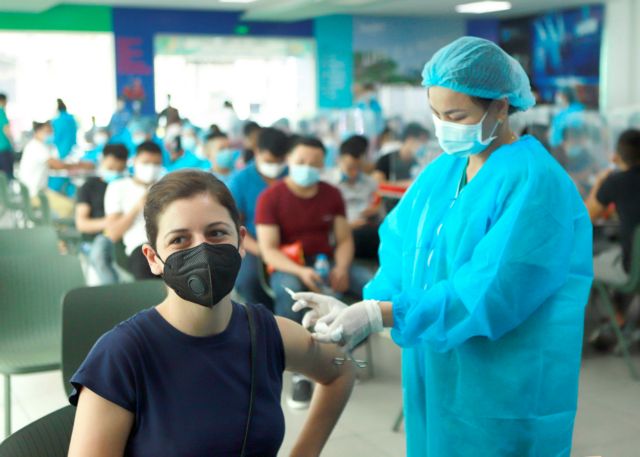.jfif) Opinion
Opinion


|
| 500 employees of Piaggio Việt Nam, based in Bình Xuyên Industrial Zone in the northern province of Vĩnh Phúc, received COVID-19 vaccine jabs on July 17, 2021. — VNA/VNS Photo Hoàng Hùng |
Vice chairwoman of the National Institute of Hygiene and Epidemiology, Dương Thị Hồng, talks to the Chính Phủ (Government) portal about COVID-19 vaccinations.
What are the post-vaccination symptoms of current COVID-19 vaccines? Which kinds of COVID-19 vaccines are authorised for use in Việt Nam? Can people get two shots of two different vaccines (vaccine mixing)?
Each vaccine comes with recommendations from the manufacturer and the World Health Organisation (WHO) about the frequency of adverse events following immunisation, ranked very common to common, to uncommon, to rare and very rare.
All of the COVID-19 vaccines can have side effects like pain, swelling and/or redness at the injection site. They can also have systemic reactions such as fever, discomfort, fatigue and loss of appetite. There may also be cases of serious complications after getting vaccinated such as allergic reactions and anaphylaxis but that is very rare.
Currently, according to recommendations from manufacturers and the WHO, each person should get two shots of the same type of COVID-19 vaccine.
However, depending on the amount of vaccines Việt Nam receives, the Ministry of Health has issued instructions for localities that, in case of limited vaccines, those who got the first shot of AstraZeneca will be prioritised to get their second shot from Pfizer after 8-12 weeks if they agree. Those people will have their health strictly monitored after their immunisation.
At vaccination sites, there are different types of COVID-19 vaccines. What should we do to avoid confusion when injecting people as well as to ensure their safety?
Việt Nam has been supplied with four types of COVID-19 vaccines, AstraZeneca, Pfizer, Moderna and Sinopharm. The Ministry of Health has provided detailed instructions for localities about storage, transport and injection requirements for each kind of vaccine.
The ministry held a conference on July 13 to provide training for medical workers, including those from localities’ districts and communes, who will take part in the vaccination, about the use of new COVID-19 vaccines. Training has been regularly organised at all levels with the aim of maximising vaccination safety.
At vaccination sites, medical workers will advise people on which kind of vaccine they should receive, depending on the availability of vaccine types and the kind of vaccine they were injected with first.
There is no vaccine that is completely safe and no kind of vaccine is 100 per cent effective against the disease. But people should still get vaccinated against COVID-19 to protect their health as well as protect the community.
It has been suggested that people receive a booster shot after six months. What do you think about this?
Thailand and some other countries are doing research on this issue. They are researching whether or not, after getting the first two shots of AstraZeneca vaccine, people should get another shot in order to enhance immunity.
However, the WHO has not yet given any official recommendation. If there are any new recommendations about vaccines, we will share with people immediately.
Has the Ministry of Health studied vaccinating children under 18 years old?
The Ministry of Health has provided official guidelines for vaccinating people over 65 years. However, most of them have underlying conditions so caution should be taken during the vaccination process. Including having a prescription from a doctor and having the vaccination carried out at a qualified medical establishment.
The WHO has recommended vaccinating children 12 years old and above. Most countries want to vaccinate this group but the vaccine supply is limited at present.
The Ministry of Health and Pfizer reached an initial agreement on a deal for another 20 million doses of Pfizer/BioNTech COVID-19 vaccine. It is to be used specifically for children aged between 12 and 18 years old. They reached the agreement at an online working session with Pfizer Việt Nam Country Manager and Chief Representative, John Paul Pullicino, on July 14.
The Pfizer representative said the company is committed to bringing 20 million doses to Việt Nam within the fourth quarter of 2021 to assist the country’s inoculation efforts.
Việt Nam has around 9 million children in this age group.
Việt Nam plans to vaccinate 70 per cent of the population (18 years old and above) by April 2022. This is the largest group of people of working age. We will try to inoculate other groups when we have more data from other countries and the WHO. — VNS